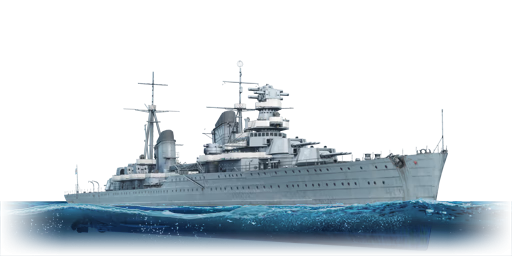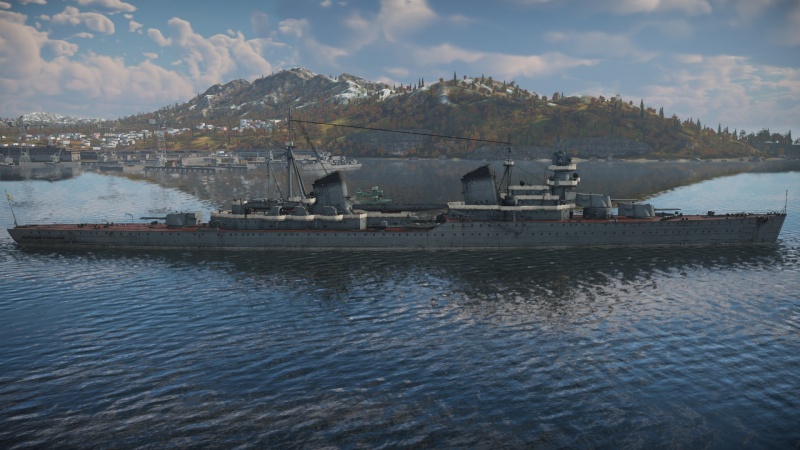Difference between revisions of "Maxim Gorky"
Colok76286 (talk | contribs) (Edits) |
m (Added in armour based on what Voroshilov's wikipediaentry says, but changed to suit Gorky's modified armour scheme.) (Tag: Visual edit) |
||
| Line 12: | Line 12: | ||
=== Survivability and armour === | === Survivability and armour === | ||
{{Specs-Fleet-Armour}} | {{Specs-Fleet-Armour}} | ||
| − | '' | + | '''''Armour scheme:''''' |
| + | |||
| + | * ''150 mm rolled homogeneous armour around the bridge and elevator'' | ||
| + | * ''70 mm rolled homogeneous armour at the citadel'' | ||
| + | * ''70 mm rolled homogeneous armour on the front of each main turret'' | ||
| + | * ''50mm rolled homogeneous armour on the sides and rear of each main turret'' | ||
| + | * ''25 mm rolled homogeneous armour around the small command tower at the secondary firing platform'' | ||
| + | * ''30 mm rolled homogeneous armour around the steering gear'' | ||
| + | * ''14 mm anti-fragmentation armour on the torpedo tube mounts'' | ||
| + | * ''8 mm rolled homogeneous armour on the gunshields of the 100mm B-34 cannons'' | ||
| + | |||
| + | ''As with the other Kirov-class cruisers, the Maxim Gorky is best described as an oversized light cruiser. She dwarves most of the other proper light cruisers and rivals the size of a heavy cruiser (just shorter than [[Mogami (Family)|Mogami-class]] heavy cruisers by 13 meters). Gorky's size is essentially a double-edged sword: it can be easily targeted at any ranges, yet it's very survivable despite only having a simple 70 mm of citadel armour, this is because most of Gorky's critical components (such as main battery ammo racks and engines) were located inside the citadel sitting just below the waterline. This essentially turned the whole upper hull into a huge bullet sponge that can contain a lot of damage, save for a well-struck shot. Other than the citadel armour, Gorky's main turrets are also covered with 70 mm of armor to protect it from HE shells.'' | ||
| + | |||
| + | ''However, as mentioned above, Gorky lacks any substantial anti-fragmentation armour to protect her crew from incoming fire. This is essentially her Achilles' heels as she can be overwhelmed by several enemy ships firing HE shells at her. She is also vulnerable to bombs and torpedoes due to lack of hull armour as well.'' | ||
=== Mobility === | === Mobility === | ||
| Line 80: | Line 93: | ||
== See also == | == See also == | ||
''Links to articles on the War Thunder Wiki that you think will be useful for the reader, for example:'' | ''Links to articles on the War Thunder Wiki that you think will be useful for the reader, for example:'' | ||
| + | |||
* ''reference to the series of the ship;'' | * ''reference to the series of the ship;'' | ||
* ''links to approximate analogues of other nations and research trees.'' | * ''links to approximate analogues of other nations and research trees.'' | ||
Revision as of 20:44, 30 September 2021
Contents
Description
The Pr.26-bis, Maxim Gorky, 1941 is a gift rank V Soviet light cruiser with a battle rating of 5.7 (AB/RB/SB). It was introduced during Update "Starfighters" as a reward for the 2020 Operation S.U.M.M.E.R. event.
General info
Survivability and armour
Armour scheme:
- 150 mm rolled homogeneous armour around the bridge and elevator
- 70 mm rolled homogeneous armour at the citadel
- 70 mm rolled homogeneous armour on the front of each main turret
- 50mm rolled homogeneous armour on the sides and rear of each main turret
- 25 mm rolled homogeneous armour around the small command tower at the secondary firing platform
- 30 mm rolled homogeneous armour around the steering gear
- 14 mm anti-fragmentation armour on the torpedo tube mounts
- 8 mm rolled homogeneous armour on the gunshields of the 100mm B-34 cannons
As with the other Kirov-class cruisers, the Maxim Gorky is best described as an oversized light cruiser. She dwarves most of the other proper light cruisers and rivals the size of a heavy cruiser (just shorter than Mogami-class heavy cruisers by 13 meters). Gorky's size is essentially a double-edged sword: it can be easily targeted at any ranges, yet it's very survivable despite only having a simple 70 mm of citadel armour, this is because most of Gorky's critical components (such as main battery ammo racks and engines) were located inside the citadel sitting just below the waterline. This essentially turned the whole upper hull into a huge bullet sponge that can contain a lot of damage, save for a well-struck shot. Other than the citadel armour, Gorky's main turrets are also covered with 70 mm of armor to protect it from HE shells.
However, as mentioned above, Gorky lacks any substantial anti-fragmentation armour to protect her crew from incoming fire. This is essentially her Achilles' heels as she can be overwhelmed by several enemy ships firing HE shells at her. She is also vulnerable to bombs and torpedoes due to lack of hull armour as well.
Mobility
| Mobility Characteristics | |||
|---|---|---|---|
| Game Mode | Upgrade Status | Maximum Speed (km/h) | |
| Forward | Reverse | ||
| AB | |||
| Upgraded | 78 | 23 | |
| RB/SB | |||
| Upgraded | 67 | 19 | |
It is faster than similar ships by a few km/h, but it still isn't a great advantage.
Modifications and economy
Armament
Primary armament
Provide information about the characteristics of the primary armament. Evaluate their efficacy in battle based on their reload speed, ballistics and the capacity of their shells. Add a link to the main article about the weapon: {{main|Weapon name (calibre)}}. Broadly describe the ammunition available for the primary armament, and provide recommendations on how to use it and which ammunition to choose.
Secondary armament
Some ships are fitted with weapons of various calibres. Secondary armaments are defined as weapons chosen with the control Select secondary weapon. Evaluate the secondary armaments and give advice on how to use them. Describe the ammunition available for the secondary armament. Provide recommendations on how to use them and which ammunition to choose. Remember that any anti-air armament, even heavy calibre weapons, belong in the next section. If there is no secondary armament, remove this section.
Anti-aircraft armament
An important part of the ship's armament responsible for air defence. Anti-aircraft armament is defined by the weapon chosen with the control Select anti-aircraft weapons. Talk about the ship's anti-air cannons and machine guns, the number of guns and their positions, their effective range, and about their overall effectiveness – including against surface targets. If there are no anti-aircraft armaments, remove this section.
Additional armament
Describe the available additional armaments of the ship: depth charges, mines, torpedoes. Talk about their positions, available ammunition and launch features such as dead zones of torpedoes. If there is no additional armament, remove this section.
Usage in battles
The main cannons of the vehicle are good and should be used as its main weaponry in comparison with other ships that have good secondary armament. The best tactic would consist on staying behind cover to prevent being killed by torpedoes and paying attention to planes flying nearby because of the lack of good AA. The main armament has an excellent rate of fire, so it is possible to run out of ammo.
Pros and cons
Summarise and briefly evaluate the vehicle in terms of its characteristics and combat effectiveness. Mark its pros and cons in the bulleted list. Try not to use more than 6 points for each of the characteristics. Avoid using categorical definitions such as "bad", "good" and the like - use substitutions with softer forms such as "inadequate" and "effective".
Pros:
- The main cannons have a short reload time.
- Although it has the same ammo as the Krasny Kavkaz, the HE filler is high in comparison with other shells of similar calibre.
- Better armour than the Kirov, which is the ship it was based on.
Cons:
- The anti-air is really inadequate consisting on 45 mm manually reloaded cannons with no time or proximity fuse, some DShKs and some 100 mm cannons that can use proximity fuse.
- It has a really high repair cost.
History
Describe the history of the creation and combat usage of the ship in more detail than in the introduction. If the historical reference turns out to be too long, take it to a separate article, taking a link to the article about the ship and adding a block "/History" (example: https://wiki.warthunder.com/(Ship-name)/History) and add a link to it here using the main template. Be sure to reference text and sources by using <ref></ref>, as well as adding them at the end of the article with <references />. This section may also include the ship's dev blog entry (if applicable) and the in-game encyclopedia description (under === In-game description ===, also if applicable).
Media
Excellent additions to the article would be video guides, screenshots from the game, and photos.
See also
Links to articles on the War Thunder Wiki that you think will be useful for the reader, for example:
- reference to the series of the ship;
- links to approximate analogues of other nations and research trees.
External links
| USSR light cruisers | |
|---|---|
| Imperial Russia | |
| Svetlana-class | Krasny Krym* · Krasny Kavkaz* |
| * Laid down by Imperial Russian Navy; Finished and renamed by the USSR | |
| Project | Soviet Union |
| Pr.26 | Kirov · Voroshilov · Maxim Gorky |
| Pr.68 | Chapayev · Zheleznyakov |
| Pr.68-bis | Sverdlov · Mikhail Kutuzov |
| Pr.68-bis-ZiF | Shcherbakov |
| Lend-Lease | USA |
| Omaha-class | Murmansk |
| Trophies | Italy |
| Condottieri-class | Kerch |





